
Runcorn is an industrial town and cargo port in the Borough of Halton in Cheshire, England. Its population in 2011 was 61,789. The town is in the southeast of the Liverpool City Region, with Liverpool 11 miles (18 km) to the northwest across the River Mersey. Runcorn is on the southern bank of the River Mersey, where the estuary narrows to form the Runcorn Gap.
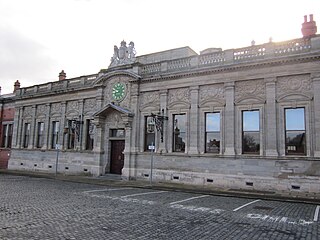
Lever Brothers was a British manufacturing company founded in 1885 by two brothers: William Hesketh Lever, 1st Viscount Leverhulme (1851–1925), and James Darcy Lever (1854–1916). They invested in and successfully promoted a new soap-making process invented by chemist William Hough Watson. Lever Brothers entered the United States market in 1895 and acquired Mac Fisheries, owner of T. Wall & Sons, in 1925. Lever Brothers was one of several British companies that took an interest in the welfare of its British employees. Its brands included "Lifebuoy", "Lux" and "Vim". Lever Brothers merged with Margarine Unie to form Unilever in 1929.
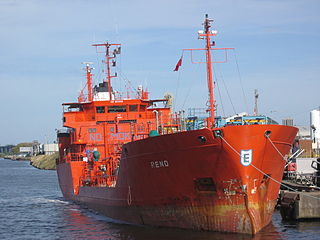
Runcorn Docks, originally the Bridgewater Docks, is an inland port on the Manchester Ship Canal in the town of Runcorn, Cheshire, England. It is operated by Peel Ports and handles bulk and project cargo.
Hazlehurst may refer to the following places in the United States:
United Alkali Company Limited was a British chemical company formed in 1890, employing the Leblanc process to produce soda ash for the glass, textile, soap, and paper industries. It became one of the top four British chemical companies merged in 1926 with Brunner Mond, Nobel Explosives and British Dyestuffs Corporation to form Imperial Chemical Industries.
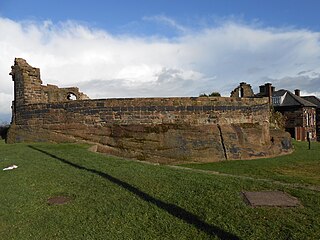
Halton Castle is a castle in the village of Halton which is part of the town of Runcorn, Cheshire, England. The castle is situated on the top of Halton Hill, a sandstone prominence overlooking the village. A motte and bailey castle was built with construction starting in 1071, the original building was replaced with the current sandstone castle in the 13th Century. Building alterations continued until at least 1609 when the structure is recorded as in disrepair. The castle is recorded in the National Heritage List for England as a designated Grade I listed building, and a scheduled ancient monument.
Thomas Hazlehurst was an English businessman who founded the soap and alkali manufacturing company of Hazlehurst & Sons in Runcorn, Cheshire. He was also a devoted Methodist and he played a large part in the civic matters of the town.
Thomas Hazlehurst may refer to:

Thomas Hazlehurst was known nationally as "the Chapel Builder" and more locally as "the Prince of Methodism" or "the Prince of the Wesleyans". He was given these titles because of his generosity in paying wholly or largely for the building of some 12 chapels and three schools in the area of Runcorn, Widnes and the villages in north Cheshire. His father, also called Thomas, had founded a profitable soap and alkali manufacturing business, Hazlehurst & Sons, in Runcorn in 1816.
Joseph Crosfield was a businessman who established a soap and chemical manufacturing business in Warrington, which was in the historic county of Lancashire and is now in the ceremonial county of Cheshire. This business was to become the firm of Joseph Crosfield and Sons.
Gossage is a family name of soapmakers and alkali manufacturers. Their company eventually became part of the Unilever group. During World War II, all soap brands were abolished by British government decree in 1942, in favour of a generic soap. When conditions returned to normal post war, the Gossage brand was not revived by Unilever though the company name is still registered for legal purposes. The online 'Times Index' shows meetings of the Gossage company board until the early 1960s.
Thomas Alcock was a clergyman in the Church of England, a pluralist and an author.
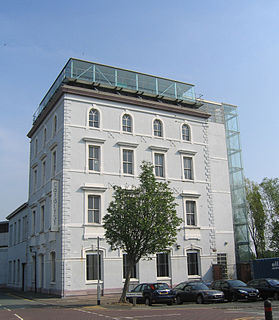
Widnes is an industrial town in the Borough of Halton, Cheshire, England, on the north bank of the River Mersey where it narrows at Runcorn Gap. The town contains 24 buildings that are recorded in the National Heritage List for England as designated listed buildings. Of these, 5 are classified at Grade II*, and the rest are at Grade II; Widnes has no Grade I listed buildings. In the United Kingdom, the term "listed building" refers to a building or other structure officially designated as being of special architectural, historical, or cultural significance. Listed buildings are categorised in three grades: Grade I consists of buildings of outstanding architectural or historical interest; Grade II* includes particularly significant buildings of more than local interest; Grade II consists of buildings of special architectural or historical interest. Buildings in England are listed by the Secretary of State for Culture, Media and Sport on recommendations provided by English Heritage, which also determines the grading.
John & Thomas Johnson was a soap and alkali manufacturing business in Runcorn, Cheshire, England during the 19th century.

James Hargreaves was a British chemist and an inventor. He was born at Hoarstones in Fence, Lancashire, the eldest child of James Hargreaves, a schoolmaster at Slaithwaite near Marsden. His father moved to Sabden but as he found his salary to be insufficient the father became a druggist in 1844, later moving to Preston.
Neil Mathieson was a Scottish chemist and businessman.

Charles Wigg was an English manufacturer of chemicals in Runcorn, Cheshire, England. After working as an export agent in Liverpool he joined with two managers of a Runcorn chemical factory to build what was initially known as the Old Quay Chemical Works, and later became Wigg Works. At first the works manufactured soap and alkali, but soon moved to extracting copper from pyrites ash, and later making bleaching powder and ferric oxide. During the later part of the 19th century it was one of the most successful businesses in Runcorn. Charles Wigg retired from the business shortly after it was taken over by the United Alkali Company and died eight years later. The site of the factory has been developed into a nature reserve called Wigg Island.
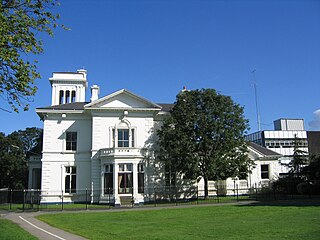
Runcorn Town Hall is in Heath Road, Runcorn, Cheshire, England. It is recorded in the National Heritage List for England as a designated Grade II listed building. It was originally built as Halton Grange, a mansion for Thomas Johnson, a local industrialist. After passing through the ownership of two other industrialists, it was purchased in the 1930s by Runcorn Urban District Council and converted into their offices.

The Runcorn to Latchford Canal ran from Runcorn, Cheshire to the Latchford area of Warrington, then in the historic county of Lancashire, England. It connected the Mersey and Irwell Navigation to the River Mersey at Runcorn.
Duncan McKechnie was a British chemical manufacturer and metal extractor. He was trained as a soap boiler in Glasgow and later moved to become a foreman at a soap and alkali factory in Runcorn, Cheshire. In 1869 he entered into partnership with two colleagues to run a new chemical factory in the town, but soon left to found his own company in St Helens. This company specialised in extracting and refining metals. It was sold to the United Alkali Company in 1891. After McKechnie's retirement his descendants continued to run factories bearing the name McKechnie into the 20th century.











